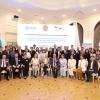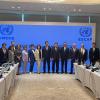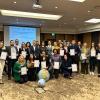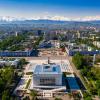News
Displaying Results 1 - 13 of 13
Mapping air pollutant emission sources in a country helps experts and decision-makers identify the most effective policies. Understanding the regional distribution of emissions is crucial for effective policy implementation.
Spatially allocating—or gridding—emissions is technically challenging.…
Responding to the request of the Governing Council of the United Nations Special Programme for the Economies of Central Asia (SPECA), UNECE is building the capacity of public and private experts in the SPECA participating States to use the semantic standards and reference data models of the UN…
Central Asia is well placed to produce fresh and dried fruit and vegetables. Countries like Kyrgyzstan, Tajikistan, and Uzbekistan are important producers of dried fruit, in particular apricots. However, traders from the region have been facing challenges with diversifying their export portfolios…
In North Macedonia, assisting households to make investments in green technologies not only supports climate action, but also helps them save on energy costs and improves living standards.
To support this aim, UNECE, UNDP, and IOM organized a Capacity Building Workshop in Skopje on the design of…
Extreme weather events exacerbated by climate change increasingly threaten the ability of countries worldwide, including those in the UNECE region, to sustain safe, reliable, and equitable transport and mobility.
Adapting to future impacts of climate change is therefore no longer a concern to be…
With its strong mining industry, mountainous areas and high seismic hazards, prevention and preparedness for disasters and climate change adaptation are high on Tajikistan’s agenda. In particular, the increasing frequency and severity of weather events due to climate change can undermine the safety…
The Fourth Cycle of UNECE Environmental Performance Reviews (EPR) is underway with the fourth review of Montenegro, carried out under the leadership of UNECE.
A large, multidisciplinary team of international experts worked in Podgorica from 22 to 30 April 2024, assessing the environmental…
Addressing the Tashkent International Investment Forum (2-3 May 2024), UNECE Executive Secretary Tatiana Molcean called for the mobilization of private sector investments to support the implementation of the Sustainable Development Goals (SDGs) and to foster regional cooperation in Central Asia.…
Increasing the use of digital solutions including those developed by the United Nations Centre for Trade Facilitation and Electronic Business (UN/CEFACT) can enhance the sustainability and resilience of supply chains and strengthen global connectivity.
In a series of capacity-building activities…
Mapping air pollutant emission sources of a given country can help experts and decision-makers understand which policies are most viable. Spatial allocations of emissions are also important to understand where emissions are coming from on a regional level.
Spatially allocating – or gridding –…
Guaranteeing safe access to drinking water and sanitation remains a challenge in the pan-European region, with 16 million people still lacking access to basic drinking water services and over 29 million people not having access to basic sanitation, including hundreds of thousands who have to…
Four years ago, when the COVID-19 pandemic hit, it disrupted the normal functioning of open markets. The ensuing crisis had crippling effects on global trade and productive capacities: it broke supply chains, reduced connectivity and slowed the flow of essential goods. Global food and energy…
In recent years, Montenegro and its capital city, Podgorica, have been committed to accelerate sustainable and smart urban development through a variety of ambitious national and regional and local measures, such as digitalization of public services, modernization of public transport, and to…














